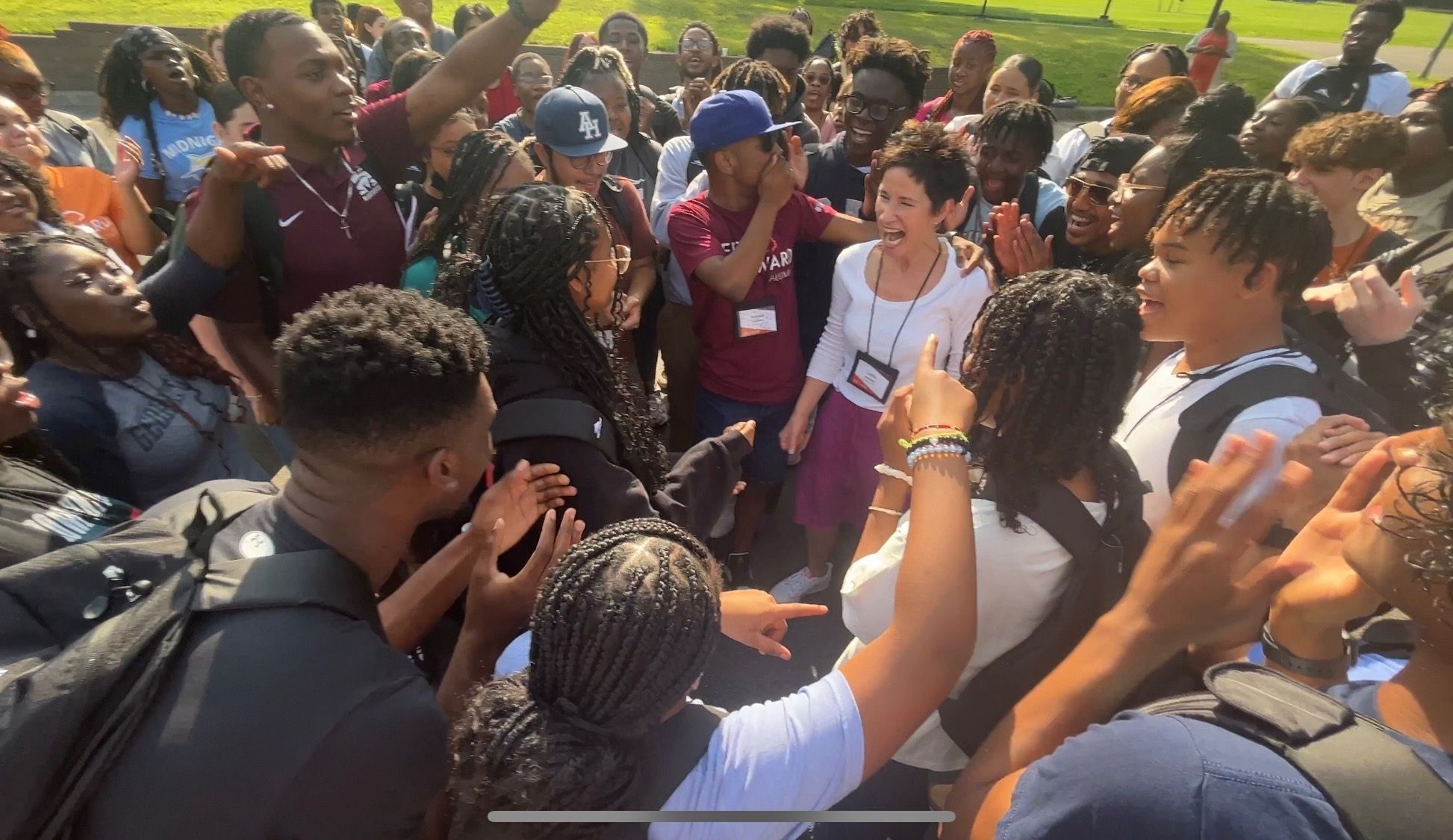One of the great things about college is having rich access to performing arts. It felt like every weekend there were dance performances, a cappella group shows, plays or speaker events.
There was a dancer in our freshman dorm, a lanky white boy with kind eyes and strawberry blonde hair. When we went out to see him perform, the young women in our group, many of whom had a low key crush on this guy, would scream:
"I see you Johnny!" as he strutted on stage.
This expression is part of a trifecta representing our deeply human desire for connection:
- I see you: your actions matter
- I hear you: your voice matters
- I feel you: your emotions matter
Human beings are social and tribal creatures. There is a reason why solitary confinement is the ultimate punishment for disruptive inmates and why it so quickly harms our fundamental sense of self.
We need to see others and be seen by them.
My friends Ricky and David started Flow Club to help freelancers, remote workers, ADHDers, coffee shop lovers, and anyone who wants a little company and social accountability to get things done with others—a term some call 'body doubling'. As an occasional Flow Club host, I've seen attendees who have 300, 500, even 1000 Flow sessions under their belt.
Which brings us to Shopify.
A few weeks ago, they made wave on the web for deleting over 12,000 meetings and attaching a price tag to every meeting based on everyone's prorated salary for the meeting duration.
Note that the image below suggests that a 1 hour meeting for 7 costs 2,115, which indicates (based on salary/total comp alone) that this crew is averaging $628k per year—far beyond what 99% of workers might expect to earn.

But still, we've all been in meetings that weren't well run and big long meetings with even less well compensated staff might still rack up a high bill, especially if they repeat on a regular basis. I'm certainly not here to be an apologist for useless meetings.
But the idea that we could eliminate many or most meetings really only works with a very small group of people who have a very low level of desire to see or be seen by others. A team of introverts and abstract thinkers—who granted are abundant in tech—might be able to pull this "docs and tasks only" version of work.
But the reality is that work is also a huge part of most people's social structure. This is why getting laid off is so jarring even when you have severance. You are suddenly cut off from a huge circle of relationships and regular contacts that helped feed your need for connection.
Meetings are a chance for people to see each other, confirm each other's words, feelings, and existence, and are nearly inseparable from the act of collaborative work. Of course some organizations have been successful with few or no meetings, but they are exceptional in that the vast majority of even very successful organizations still have lots of meetings.
I find the cheering for this meeting deletion movement odd in the face of return to office and the decrying of distributed workforces. Having worked on internal productivity tools for years at Meta/Facebook, it was clear from our research that remote workers were slower to onboard and felt less connected to their teams and the company than those who joined in office.
The fact is, meetings are often ineffective because most workers aren't disciplined enough to:
- share an agenda in advance of the meeting
- prioritize discussion topics
- make crisp decisions
- provide constructive feedback
- assign next steps / follow ups
Do you really think that if we cancelled the meeting, they'll be disciplined enough to write clear documents/emails, have timely and productive async discussions, make and disseminate decisions, and assign next steps?
People tend to be better at talking and listening than reading and writing. That's not good or bad, that's just how it works. And maybe you can hire for people who are remarkably good at the latter, but it'll still probably be easier for them to do the former.
This is all assuming there's no emotional or interpersonal conflict in the interaction. And even when everyone is a professional and generally kind and helpful, conflict can emerge.
I remember a meeting where we had to let a team know that we were deprioritizing work on the architecture they had built their product around, and encouraged them to switch to our new framework.
They were, in a word, pissed.
But I came right out and told them they had every right to be upset. I acknowledged the effort they had put into the integration, and recognized how patient they had been with us as we worked out the bugs with the original architecture, and how bad we felt about having to deprecate it. I listened to their complaints and acknowledged their anger.
In other words, they felt seen, heard, and felt.
That opened the door for us to explain why the new framework would be more performant and scalable, which is why we were switching to it. By the end of the meeting, they weren't exactly thrilled, but they were no longer outraged and ready to tear us a new one.
Imagine if I tried to do that in an email.
My sister recently sent me an excerpt from A Crisis of Connection by Niobe Way, an applied psychology professor at NYU. The excerpt described how boys and girls consistently described a desire for and engagement in close, intimate relationships with friends that slowly faded as social pressures required them to change and withdraw how they expressed themselves.
Like girls, boys openly express their desire for genuine connections with others, including with boys. They reveal the human capacity for mutual understanding, care, and empathy and demonstrate remarkably astute abilities to read the human world. Yet as they reach middle to late adolescence and as expectations of manhood intensify, they begin to experience a crisis of connection in which they speak about losing trust and closeness in their male friendships and, for some, no longer believe its possible to have intimate relationships with other boys even though they continue to yearn for them.
I feel our frustration with meetings are the same. We want to spend quality time with our colleagues in creative, collaborative, and purposeful ways. But we are often disappointed by distracted, uncommunicative, and self-absorbed conversations that lead nowhere.
We hope to shield ourselves from the pain of bad meetings by removing them altogether. Just as these teenage boys and girls give up on the idea of close friendships. When we need to instead do the harder thing of trying to make our relationships and meetings better.
That can mean changing how they are run. Several years ago I documented a set of new meeting formats for FastCompany including the wins meeting, goalfests, and masterminds.
It can also mean instilling a culture of agendas, or for bigger / longer meetings, pre-reads. Ensuring that whoever is driving the meeting sets forth discussion goals and contextual background 24 hours ahead of the meeting and that the other attendees commit to reading and commenting on the pre-read ahead of the meeting, so the time can be most properly used.
Meetings are never going to go away. Real-time audiovisual discussion with 1 or more people is a fundamental way human beings communicate and predates reading and writing by thousands of years.
We need to see each other. Let's make those moments count.
—Jason

Recent Issues



![162: I See You [On Better Meetings]](/content/images/size/w600/2023/07/jason.shen_abstract_photocollage_of_cartoon_eyes_conference_roo_ae9e7505-c143-48d3-9b70-8a60720ba2d0.png)

